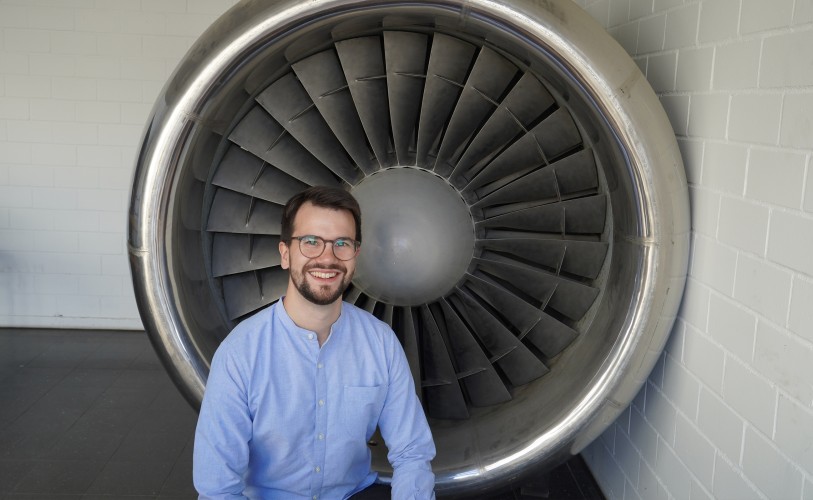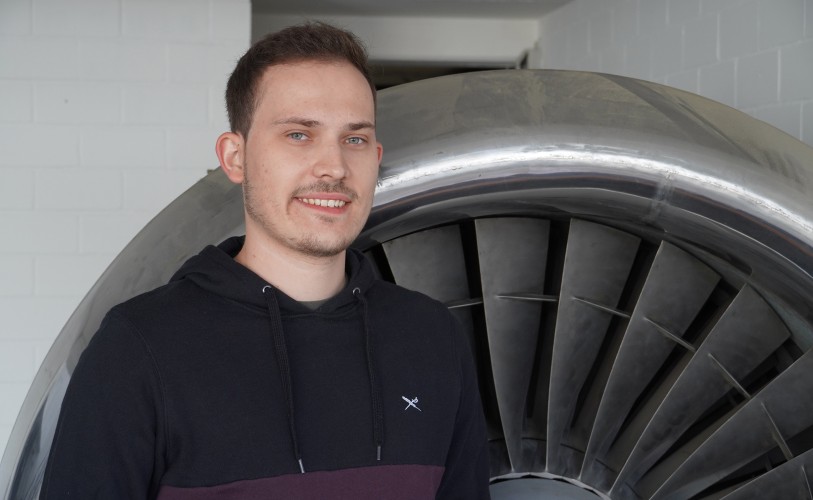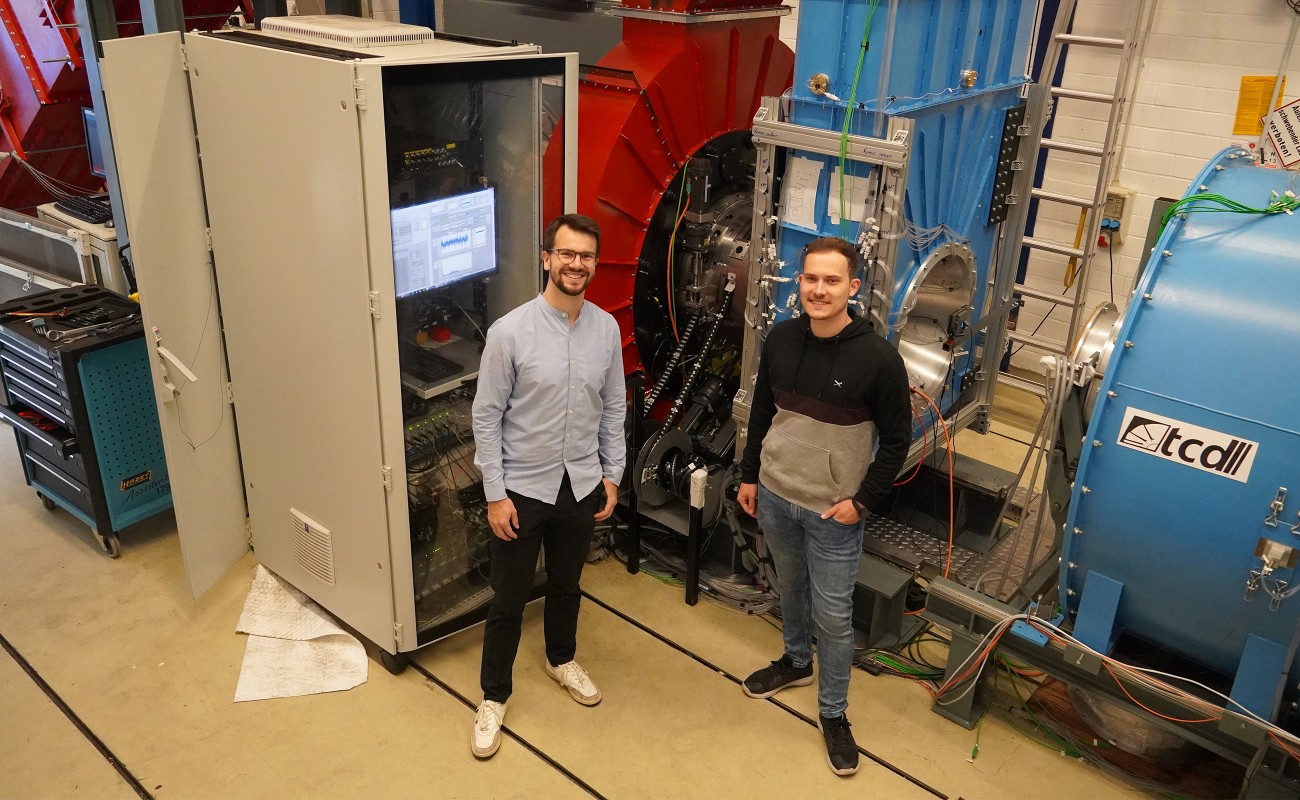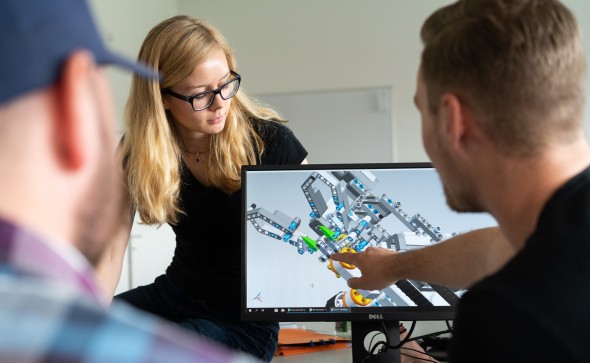Published: 13th December 2021
Fabian,
research associate at the Institute of Gas Turbines Aerospace Propulsion Systems
Actually, the Aerospace Engineering degree programme at TU Darmstadt was long overdue, as many partial competences were already available. So, it made perfect sense to bundle them into one degree programme!

Out of space: A new degree programme for TU Darmstadt
Hello there! Thank you for taking the time for our interview. First, we are very interested in why the new Aerospace Engineering degree programme at TU Darmstadt has been developed in the first place. What’s behind this?
Fabian: “In the aerospace sector, we will face major challenges in the coming years. For example: How can we eventually come close to carbon neutrality in aviation? In my opinion, this is a huge topic that can only be mastered, if we make technological progress in this field. The same applies to space travel – private companies are currently making space travel more and more accessible. Therefore, there is an urgent need for well-trained engineers in this field who are familiar with the subject. At TU Darmstadt, the development of this Master's programme was a natural choice because the Department of Mechanical Engineering already has many modules and subject areas that cover partial research areas of aerospace.”
Nicklas: “Exactly. Lectures, modules, the cooperation with ESA (the European Space Agency), large-scale research projects – TU Darmstadt already had that. But now, it’s also being communicated more actively to the outer world with that specific name ”Aerospace Engineering“: Anyone who is enthusiastic about aeronautics and space will fit right in at TU Darmstadt. And of course, because it is an English-language degree programme, it’s attractive for international students, but also for domestic students who would like to do an English-language Master's degree and work in this international environment.”
Wow, that sounds super exciting! So, what specific content can future students expect in this Master's programme?
Nicklas: “The degree programme covers a broad range of fundamental knowledge for the aeronautics and space sector. What makes this so special, is that the lecturers and professors often have experience not only in research but also in industry, e.g., through the cooperation professorship with ESA. This means that there are lectures with leading ESA employees who are currently working in the field. For us students, it's great to be taught the basics directly linked to practical examples. In addition, there are special focus lectures on a variety of topics – depending on what you are personally most interested in. For example, space residues, constructive lightweight design and construction methods, flight guidance, navigation, flight mechanics and mechatronic systems. The hands-on courses and projects also make up a large part of the degree programme and then, of course, the Master's thesis as the grand finale – in cooperation with the departments, which in turn cooperate with companies or with ESA. This means: When we implement a project during our studies, we know that it’s directly related to a real industrial project. That's great because you can gain practical experience during your studies and make new contacts. For those who are drawn to the big, wide world, there are also international projects, partly in cooperation with students from other, also international, universities.”
Fabian: “The topic of digitalisation is also covered in the new degree programme. We sometimes have very large amounts of data that must be processed quickly. Big data and machine learning are therefore very relevant topics. As a future engineer, you should also get a good education in this area, as programming is an important core competence in this professional field.”
Fascination technology: The must-haves for Aerospace Engineering
To whom would you recommend the Master's programme in Aerospace Engineering in general? What prerequisites are needed?
Fabian: “The basic things you should bring along are an interest in natural sciences and the practical applications of natural sciences. Furthermore, we do a lot of project work, which means teamwork is a key competence. The projects are often very complex, so you need knowledge and specialists from many different subject areas. If you are also self-motivated and have a fascination for the subject, you will fit right in the Aerospace Engineering Master's programme at TU Darmstadt.”
Nicklas: “Exactly! Interdisciplinarity is a crucial point for us. And it works very well at TU Darmstadt – even internationally, for example with students from Stockholm or London. You have to be comfortable with this extent of intense teamwork, of course, but you can really benefit from it.”
So, it's a degree programme for real team players and science fans. What fascinates you personally about the subject matter?
Nicklas: “I am clearly fascinated by the aspect of ”high technology“ which means that we work with a complex interplay of so many different areas. I have always been enthusiastic about science, and I see great challenges in this field, which I am keen on. And regarding the topic of interdisciplinarity: what we learn in the aviation sector can also possibly be applied to wind turbines in the future to generate energy in a more sustainable and environmentally friendly way. That’s an incredible potential!”
Fabian: “My fascination lies primarily in aircraft propulsion technology and flying. Before I started my studies, I didn't understand at all how an engine works, and then I dove deeper and deeper into the topic of this fascinating machine. Currently, we are at a point where conventional engines will undergo a major change in the next few years. That's why it's still exciting to do research on it and, especially with an eye on climate change, to simply continue to improve technology bit by bit.”
Aerospace Engineering at TU Darmstadt – the right choice for you
But let's get down to brass tacks: Why should one study the Aerospace Engineering Master's degree at TU Darmstadt?
Nicklas: “I attended many of the space lectures that are part of the cooperation professorship withESA. During these lectures, we sometimes have a live connection to the ESOC satellite control centre (European Space Operations Centre) or we go on various excursions. So, it's very hands-on and extremely exciting.”
Fabian: “We are located in the Rhine-Main region, which is one of the most developed regions in Germany in terms of infrastructure. Accordingly, we’re also close to Frankfurt Airport, and there are also many companies in the vicinity that deal with the topic of aerospace. One can gather valuable contacts through joint projects during the studies, already. In addition to that, TU Darmstadt has its own research airfield and a research aircraft. We also have access to large wind tunnel facilities, where complete models of aircrafts (or models of cars, buildings, etc.) are placed to measure aerodynamic forces.”
Nicklas: “What I also particularly like is that although you study Aerospace Engineering, you have a wide range of options and modules at TU Darmstadt. You can specialise freely and independently in the degree programme and pursue your personal interests.”
Great, sounds like TU Darmstadt really has a lot to offer! The hands-on topic has already been mentioned briefly – so Aerospace Engineering is a very practice-oriented Master's programme?
Nicklas: “Absolutely. There are a few projects that we work on in teams of 5 to 6 students. These also include tutorials that go in a similar direction, teach theoretical basics and are practice oriented. One such project is, for example, the practical course in flight mechanics, where you sit in the aircraft yourself and carry out flight tests and measurements up close. And then, of course, there is the Master's thesis, which is carried out in one of the subject areas on specific research and industrial projects. That means you work directly with partners inside the industry, have meetings, develop, and conduct experiments, give presentations – sometimes in front of a larger audience, especially in an international context.”
Fabian: “We have three large test benches in the department, which enable us to test important subcomponents of an aircraft engine individually. In case of a Master's thesis, you could work on this test bench as part of a research project, help design the measuring technology, carry out the measurements and then analyse and evaluate them. It almost doesn't get any more hands-on than that! We also have great opportunities to employ students as student assistants – not only during the thesis, but also before.”
Plans for the future? Of course!
Now that we've learned a lot about the degree programme, here comes the question of all questions: Do you already have plans for your life after university?
Nicklas: “For a long time, I was sure that I wanted to dive straight into the industry. Especially in the aerospace industry, young engineers are currently sought-after. In my internship at Lufthansa Technik, I worked more in the field of digitisation and, for example, dealt with the maintenance of aircrafts and how it can be monitored and optimised in the future with machine learning applications. Currently, however, my dream is to continue my research at university. Through my thesis, I got to know the collaboration at the university and with different companies, and that was super interesting.”
Fabian: “If you choose aerospace engineering, it doesn't necessarily mean that you have to work in aerospace later. For example, basics like aerodynamics are relevant in many other places and areas – for example for wind turbines. In principle, the problems and challenges of wind turbines are similar to those of other turbines. There are also graduates who work in the field of medical technology and develop computed tomography. It's incredibly diverse. That's why I'm happy to be able to do my PhD at TU Darmstadt and I'm looking forward to seeing where I’ll eventually end up!”
Wow, very diverse – you're really spoilt for choice. We are curious to see where your journey will lead you one day! Thank you very much for the exciting interview! Do you have any concluding words for those interested in Aerospace Engineering?
Fabian: “Aerospace Engineering at TU Darmstadt is very versatile and exciting – I can only recommend everyone to study here!”
Nicklas: “I would be happy if TU Darmstadt manages to stand out as a flagship in the field of aerospace in the next few years – because it really deserves that!”
Master Aerospace Engineering at a glance – orientation offer for prospective students
Are you ready to study Aerospace Engineering? Test yourself!
The online tool OSA will help you make an informed choice about your degree. You can answer questions on your expectations for the degree course, your approach to learning, as well as specialised tasks on focus topics and existing knowledge on the degree programme. Participation remains entirely anonymous and has no impact on a potential application and admission procedure at TU Darmstadt. The results are solely for your own information and self-assessment. Why not give it a try?
Getting started: Master Aerospace Engineering
You’ve finished your Bachelor's degree and are now getting started with the Master Aerospace Engineering at TU Darmstadt? Here you’ll find all the information you need for a successful start.
MasterPlus Mentoring
When you are admitted to the Master's programme, you will also receive access to the MasterPlus Mentoring. Our MasterPlus student mentors share their experiences with you and help you with many useful tips. In personal conversations, you can exchange your first impressions and clarify questions or problems. They will also help you find information or contact the right person. This also applies to topics beyond your studies, such as housing and visas.
Concurrent Engineering Lab (CELab)
In the near future, more and more complex requirements will be placed on space missions. Therefore, the technical systems must be developed efficiently and agilely. For this type of product development (“concurrent engineering”), the Institute of Flight Systems and Automatic Control (FSR) and the European Space Agency (ESA) have set up a joint research laboratory, the Concurrent Engineering Lab (CELab), at TU Darmstadt.

Nicklas
Hello, my name is Nicklas and I'm currently studying in the last semester of the new English-language Master's programme Aerospace Engineering at TU Darmstadt. The complex high technologies of aerospace have always fascinated me, so choosing an engineering degree programme in aerospace engineering at one of the best technical universities in Germany was the right step for me. Within the scope of international projects, my work as a student assistant in research on aerospace propulsion systems and my final thesis, I was able to gain experience in the research and industrial environment during my studies. There are many upcoming challenges in aviation. That’s what’s motivating me and where I see a chance to actively shape the field in the future.

Fabian
Hi, my name is Fabian. I’m doing my PhD at the Institute of Gas Turbine Aerospace Propulsion Systems at TU Darmstadt. I do research in the field of aeroelasticity and deal with problems that occur in modern aircraft engines. This topic currently challenges the European aviation industry. It will likely become even more relevant in future aircraft concepts, e.g., through the integration of the engines into the aircraft body. Before my PhD, I studied mechanical engineering at TU Darmstadt (at that time called Mechanical and Process Engineering) and didn't intend to end up in the field of aviation. Although I’ve always had a fascination for flying, I only became aware of the topic of aircraft engines during my studies. The functionality and complexity of turbomachines immediately appealed to me back then. Moreover, there are still hardly any realistic approaches to making flying climate-neutral – and if no research is done, it will remain that way for the foreseeable future.





